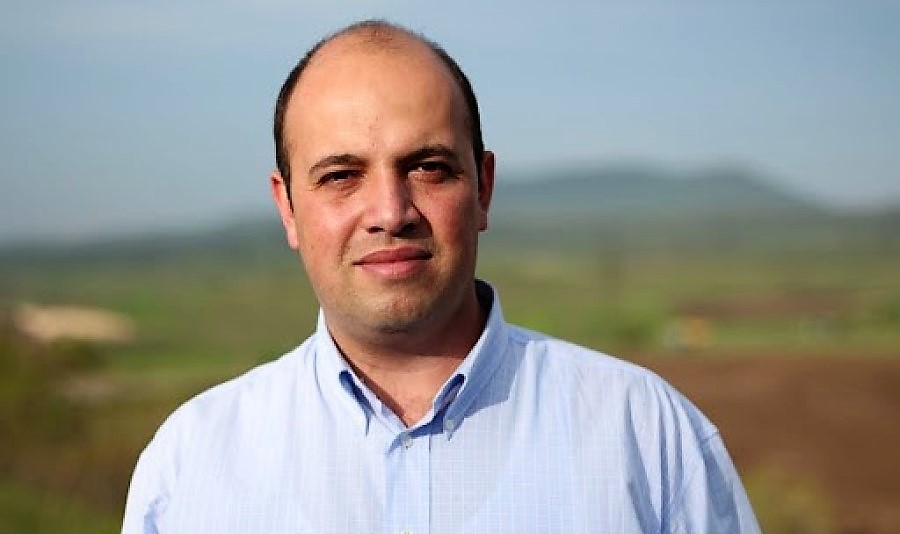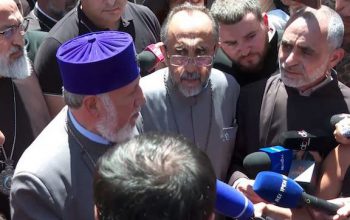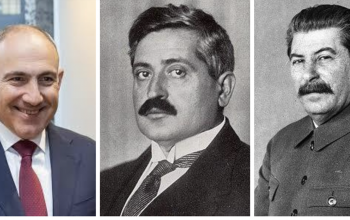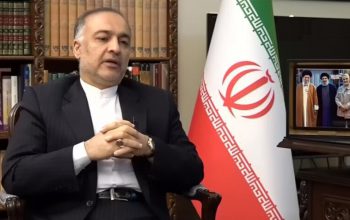BY HRANT MELIK-SHAHNAZARYAN
After the quadrilateral meeting held in Prague on October 6, Armenian Prime Minister Nikol Pashinyan, Azerbaijani President Ilham Aliyev, French President Emmanuel Macron and Council of Europe President Charles Michel issued a joint statement stating that “Armenia and Azerbaijan confirmed their commitment to the UN Charter” in the 1991 Alma-Ata Declaration, through which both sides recognize each other’s territorial integrity and sovereignty” (1).
This is a wording that reveals the entire future course of Azerbaijani-Armenian negotiations. The Armenian public is confused about what it means to recognize the territorial integrity of Azerbaijan. “Is Artsakh also a part of that integrity?”, Armenian citizens ask on different platforms, as if not wanting to believe that the struggle of the past thirty years could have such an inglorious end. And no one seems to dare to admit that yes, with this document, Pashinyan recognizes Artsakh as a part of Azerbaijan. But in order to mitigate the accusations and criticisms directed at him to some extent, the current leader of Armenia uses two small tricks.
a) He says that Armenia recognized the territorial integrity of Azerbaijan back in 1991, when it was a member of the CIS.
b) He talks about the need to create “discussion mechanisms between Baku and Stepanakert” (2).
Both of these claims are, of course, manipulative and derive exclusively from the interests of Azerbaijan. However, from the point of view of justifying himself in front of his own electorate, they are fully working for Pashinyan, who is sure that in this way he can put the blame for the recognition of Azerbaijan’s “territorial integrity” on his predecessors, and for Artsakh, make such promises that will convince his electorate that he is doing everything himself. so that the interests of Artsakh Armenians are protected. At the same time, it should be noted that Aliyev’s repeated statements that Baku’s relations with Stepanakert are Azerbaijan’s internal affairs, and they will not allow any other country to try to interfere in them, are not heard by the absolute majority of Armenian citizens. In this sense, Pashinyan and his propaganda machine are working really well.
Anyway, the main challenge facing the Armenian states today is not even the quadripartite declaration accepted in Prague, but what agenda Azerbaijan is presenting to the negotiations.
On October 3, the daily newspaper “Haykakan Zhamanak” owned by Nikol Pashinyan’s family published a remarkable article in which the author, who goes by the pseudonym “Reliable Source”, who is most likely Pashinyan himself, presented Azerbaijan’s demands to Armenia:
– Dissolution of the Nagorno-Karabakh Defense Army,
– Recognition of Nagorno-Karabakh as part of Azerbaijan, without any, even autonomous status, i.e. with 0 status,
– Corridor through the territory of Armenia,
– Demarcation and demarcation process with the maps of 1919, 1920 (so far it is not known which specific maps it is about) speech),
– Clarification of the fate of the missing Azerbaijanis, which may have a tendency to accuse Armenia of war crimes in the future (3).
Each of the mentioned points, taken separately, only proves that the goal of Azerbaijan’s policy is not the regulation of relations with Armenia, but the destruction of two Armenian states, or at least the destruction of the statehood of Artsakh and full control over Armenia. What does official Yerevan do to oppose to this? Unfortunately, nothing. Literally nothing.
On September 14, the prime minister of the country clearly stated during the NA-government question-and-answer session that he took the responsibility of making “difficult decisions”. “We want to sign a paper, as a result of which a lot of people will criticize us, a lot of people will curse, a lot of people will call us traitors, even if the people decide to remove us from the government, we will be happy and grateful that as a result, RA with an area of 29,800 square kilometers obtain lasting peace and security. I say very clearly: the decision that will ensure this, I will sign that decision, I say very clearly. And I’m not interested in what will happen to me, I’m interested in what will happen to RA” (4). And here, a few days after this announcement, “Haykakan Zhamanak” published the above-mentioned material about Azerbaijan’s demands…
There are constant reports from government circles that Pashinyan is really going to fulfill the demands of the Turkish-Azerbaijani alliance. Moreover, the elite of the ruling team is in favor of it and even demands Pashinyan to sign a peace treaty with Azerbaijan as soon as possible. However, the issue is being delayed because official Yerevan cannot decide under which of the geopolitical centers to take this step: Russia or the West. The second problem facing Pashinyan is the preservation of power after the signing of the so-called “peace” agreement. That is the reason why the person holding the post of Prime Minister is trying to leave at least one of Azerbaijan’s demands, the provision of a corridor through the territory of Armenia, unfulfilled. If he succeeds, he will use that fact to show that he has been able to secure an “interim” solution, and will declare that he has reached his goals and ushered in an “era of peace.”
Unfortunately, the solutions of the Armenian opposition are not distinguished by their effectiveness either. There have been quite active discussions on these topics in the domestic political field of Armenia recently. The proposal of Ishkhan Saghatelyan, the representative of the Supreme Council of the ARF, made on September 14 to the former presidents of Armenia, the Catholicos of All Armenians, and all the powerful forces in general, was especially noteworthy: to act with a united front, to remove Nikol Pashinyan from the post of Prime Minister and, by uniting all national resources, to solve the problems facing Armenia and Artsakh(5). After this call, Saghatelyan did quite extensive and difficult work and was able to convince the Catholicos, the former presidents of RA and Artsakh to sit around the same table and look for solutions. That meeting took place on September 22 at the Mother See. However, unfortunately until now, the participants of the meeting have not reached any results and have not made any proposals. Moreover, it became clear that in the current situation Levon Ter-Petrosyan’s proposal is to support Pashinyan and sign a new capitulation (6). Meanwhile, Armenia has quite a large potential to face external challenges both internally and externally. The question is to organize that resource and use it for the country’s security problems. However, this is a path that the authorities do not want to go, and the opposition still cannot. that in the current situation Levon Ter-Petrosyan’s proposal is to support Pashinyan and sign a new capitulation (6). Meanwhile, Armenia has quite a large potential to face external challenges both internally and externally. The question is to organize that resource and use it for the country’s security problems. However, this is a path that the authorities do not want to go, and the opposition still cannot. that in the current situation Levon Ter-Petrosyan’s proposal is to support Pashinyan and sign a new capitulation (6). Meanwhile, Armenia has quite a large potential to face external challenges both internally and externally. The question is to organize that resource and use it for the country’s security problems. However, this is a path that the authorities do not want to go, and the opposition still cannot.
Another important issue is Armenia’s external environment. As is known, in 2013 the Russian-Ukrainian crisis that started has disrupted the cooperation between Russia and the West in our region, which was previously on quite stable foundations. Basically, starting in the first months of 2014, those two geopolitical centers have stopped playing their important role in implementing conflict prevention mechanisms in the South Caucasus. From 2014 to 2020, and during the 44-day war, this function was performed exclusively by the Armenian armed forces. As of 2020 not only has that reality changed, but also the entire geopolitics of our region has changed. The balance of power, conflict containment mechanisms, aspirations and appetites of regional states have also changed, with the interests and opportunities of neighboring powers. Those changes became even more obvious as a result of Russia’s launching of a special military operation in Ukraine at the end of February of this year.
Now it is already clear, and the Russian diplomatic and expert circles are no longer trying to hide that a new big and strong player has appeared in the South Caucasus, in the form of Turkey. And this means that Armenia is obliged to develop a new security concept and conduct a policy commensurate with the existing realities.
The Russian-Ukrainian war reveals the logic of new realities as best as possible. Thus, at the end of March of this year, when it became clear that Russia could not quickly solve the military problems facing it in Ukraine, the armed forces of Azerbaijan invaded the zone of responsibility of the Russian peacekeepers in Artsakh and captured the village of Parukh and the strategic height of Karaglukh. And in the middle of September, when the Russian army suffered a series of defeats in the direction of Kharkiv, Azerbaijan attacked the eastern borders of Armenia and almost captured the city of Jermuk. It is obvious that the Turkish-Azerbaijani alliance considers its actions in the light of geopolitical transformations and harmonizes its steps with the realities that are forming in the neighboring regions. This is a process of global importance, as a result of which, according to popular opinion, a new world order will be formed. It is clear that Turkey, which has acquired great economic and political opportunities in recent years, will do everything to achieve maximum results in this geopolitical race. That is the reason why every failure of Russia gives the Turkish-Azerbaijani alliance an opportunity to become even stronger in our region, to gain new positions and to increase its own opportunities.
Official Yerevan does not seem to notice this. Pashinyan’s government considers the problems of Artsakh and our region in general exclusively in the sphere of Armenian-Azerbaijani and Armenian-Turkish relations, simultaneously trying to find solutions for itself in Moscow, Brussels and Washington. The authorities of RA did not understand that the time has come to make an election. Azerbaijan, for example, has already made that choice. Aliyev sees the future of his country in the new geopolitical pole formed by Turkey in this changing world. That is the reason why Aliyev does not hesitate to go against Russia’s regional interests from time to time and even enter into a conflict with the Kremlin. There is no such decision in Armenia. Pashinyan can go and “kiss” Putin’s hands, and in the next moment to deliver a serious blow to the same Russia. In the same way, Pashinyan works with Iran, which, by the way, in the last year has started to act as a rather influential actor in ensuring Armenia’s physical security.
The West has also taken a serious role in the ongoing geopolitical struggle in our region, whose main aim is the expulsion of Russia from the South Caucasus. Pashinyan’s government is not exempt from these developments either. In any case, it is obvious that in recent months the Armenian side has been cooperating more actively with Brussels, Paris and Washington. At the same time, it is important to note that this cooperation takes place within the framework of the political agendas of the West. The Armenian interest is completely absent here as well. In any case, it is already a fact that Armenia recognized the “territorial integrity” of Azerbaijan at the first meeting of the “European Political Community” held in Prague, as a result of the Aliyev-Pashinyan meeting with the direct participation of the presidents of France and the Council of Europe.
Of course, the above-mentioned facts do not mean that the Russian proposals for the settlement of the Armenian-Azerbaijani conflict, which, according to the Russian Foreign Ministry, have already been forwarded to Armenia and Azerbaijan, are better than those of the West. It is not so. But the important thing here is that Nikol Pashinyan’s government is busy searching for solutions that are not pro-Armenian, but the least painful for themselves. Meanwhile, as already mentioned, Armenia has internal and external solutions to face the challenges. For example, official Yerevan can and must return to the political agenda the principle of the exclusion of force or the threat of force, or at least engage in the much-needed task of restoring and reorganizing its own armed forces. Why is all this not done? I think the answer is obvious. Pashinyan and his teammates are only interested in their own government.
There has already been enough talk about ways out of the created situation. The first step, without a doubt, is the removal of the treacherous authorities. However, I think that we we see that this extremely obvious step is being delayed mainly due to different, external factors Unfortunately, the Armenian political elites have shown absolute incompetence and weakness until now. I want to say very directly: I cannot and do not want to believe that no other proposal, besides Levon Ter-Petrosyan’s capitulation agenda, has come from this level of meetings between the Catholicos, presidents, and intellectuals. There can be no such thing. This is an incredible fact. And the longer that proposal is delayed, the more dire the Armenia’s situation becomes.
_______________________________________
Links:
1. Statement of the meeting of Prime Minister Pashinyan, President Aliyev, President Macron and President Michel on October 6, 2022, 06.10.2022, https://www.primeminister.am/hy/press-release/item/2022/10/ 07/Nikol-Pashinyan-Announcement/ (access: 08.10.2022).
2. Yerevan announces the mechanisms of discussions between Stepanakert and Baku, 03.10.2022, https://www.azatutyun.am/a/32062951.html (access: 04.10.2022).
3. For the information of His Holiness the Patriarch, 3 presidents and the expert community. what does Azerbaijan want, 03.10.2022, https://armtimes.com/hy/article/245285 (access: 04.10.2022).
4. We will sign a paper, as a result of which many people will say traitor. I don’t care what will happen to me. Pashinyan, 14.09.2022, https://lurer.com/?p=481372&l=am (access: 15.09.2022).
5. The situation is dire, former presidents of RA, ministers of defense, the Catholicos should gather around one table. Ishkhan Saghatelyan, 13.09.2022, https://www.tert.am/am/news/2022/09/13/saghatelyan/3839144 (access: 15.09.2022).
6. It’s time to get a thousand times more serious. Interview with Levon Ter-Petrosyan, 26.09.2022, Public TV, News, https://youtu.be/kTeWytVBdVI (access: 27.09.2022).
Hrant Melik-Shahnazaryan




